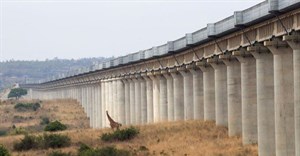Railway set to cut down cargo freight costs

Kenya Railways Corporation (KPC) Managing Director, Atanas Maina, told The East African that the corporation has received approval of the tariffs from the Ministry of Transport, which will be half the road haulage rates, and will now begin discussions with transporters.
"We had to go through the process of the approval of the freight tariffs, which the cabinet secretary approved last week. We will now start engaging the freight players on the implementation, and possibly enter into contracts with them to move their cargo," Maina said.
KRC will charge $500 to transport a 20ft container between Mombasa and Nairobi, half of the $1,000 that truck owners charge.
However, traders say they will spend an additional $200 on the last mile transport to industries and other destinations in Nairobi.
Last mile talks
The SGR cargo line will run freight trains with 54 double-stack flat wagons, carrying 216 twenty-foot equivalent units (TEU) per trip, with a load of 4,000 tonnes on each train.
"One of the key issues we will be engaging the stakeholders on is the last mile. This discussion will include whether the customers want us to do a full package that will see us deliver the goods to their doorstep or to the inland container depot," Maina said, adding that they hope to start signing contracts with cargo firms over the next three months before officially rolling out services in January.
From next month, Kenya will also scale up the cargo service and undertake a three month trial period to allow business people and cargo freighters to do pilot runs on the SGR line.
"We want to start more trials with commercial customers next month so that we can get honest feedback from them over the next three months. We already have 1,620 freight wagons, and we will receive 620 in January and February next year.
"What we have is sufficient to get the cargo line going," Maina said.
Since June, Kenya Railways has been doing a daily eight-hour cargo trip from Mombasa to Nairobi but only with government supplies. The cargo is then distributed to the rest of the country.
Kenya's Transport Cabinet Secretary, James Macharia, said that improvement of the inland container deport is critical, and that the government is looking for more land to upgrade Kenya's overall cargo-handling capacity.
Expecting an upward spiral
"The expanded ICD can only serve the country up to 2023. In the next five years, we will be expecting to see an upward spiral in cargo traffic from the current 30,000 TEUs to 500,000. That is why we need to start thinking of a bigger handling centre to accommodate this cargo growth," Macharia said.
"We have been paying the same rate to transport a container via Rift Valley Railways, so Kenya Railways will have to offer competitive rates to attract the freighters and also address the last mile issues in order to remain competitive," William Ojonyo, the Kenya International Freight and Warehousing Association chairman said.
Railway extension
In Mombasa, ongoing works to build a railway extension line from Berth Number 10 to Number 1 to ease access to cargo are being undertaken by China Railway and Bridges Corporation. The expansion will extend the fast train tracks to cover the 10 berths.
Meanwhile, Uganda hopes that cargo operators will use the SGR network from the port of Mombasa to the Nairobi inland depot, then move the cargo from there using trucks.
Ugandan traders
Kasingye Kyamugambi, Uganda's SGR project executive director said that traders were losing up to $1.2bn annually transporting their goods from Mombasa to Kampala due to inefficiencies.
"We have seen traders spending up to $5,000 to bring a container from Mombasa to Kampala. This is incurred in high insurance premiums and costs paid to trucking firms. The SGR will definitely cut down this cost drastically, including the delivery timeline," Kyamugambi said.
Currently, only five percent of imported cargo destined for Kampala uses the railway line. The rest is transported by road, either through Kenya or Tanzania.
Source: allAfrica

AllAfrica is a voice of, by and about Africa - aggregating, producing and distributing 2000 news and information items daily from over 130 African news organisations and our own reporters to an African and global public. We operate from Cape Town, Dakar, Lagos, Monrovia, Nairobi and Washington DC.
Go to: http://allafrica.com/






















